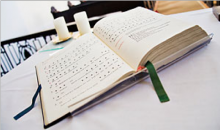The University of Foggia was officially founded with the Ministerial Decree of 5 August 1999 when the ‘Daunian' University became independent from the University of Bari. The origins of the institution, however, are deeply rooted in the cultural history of the Italian South.The first Academies in the Capitanata land (i.e. the Northern part of the Apulia region) date back to the 17th century. The city of Foggia became a lively cultural centre first when the Academies of the “Volubili” (the Volatile), the “Fantastici” (the Fantastic) and the “Invogliati” (the Attracted) were founded, and then with the establishment of the Tribunale della Regia Dogana e del Real Collegio (the Court of the Royal Customs and Royal College) and the related chairs of Law, Medicine and Agriculture.
Throughout the 19th century, a significant scientific activity was carried out by the chairs decentralised to Foggia in 1859 by the University of Naples, which at the time had almost full control over the awarding of degrees in the Italian South.
Ironically, though, the newly founded university in Foggia was ordered to close precisely in 1859, because the Casati law, passed on 13th November in the Kingdom of Sardinia and then extended to the whole of Italy, envisaged a strong centralisation of the entire educational system and the ensuing closure of many chairs which were decentralised or linked to the clergy.
The plan by Guido Bacelli, at the time Minister of Education, which opened the doors to the settlement of a university in Apulia, failed in 1894, while in 1918 Benedetto Biagi managed to organise a series of cultural activities in Foggia, which would have led to the people’s University. Due to the war events, the plan could not become effective immediately and it was not until 1919 that the People’s University of Foggia was founded, which remained confined, however, to its valuable task of disseminating knowledge.
It was only in the 1960s that the establishment of a University in Foggia could start to become a reality, thanks to the Apulia Economic Plan for the five years from 1966 to 1970. Even before the Resolution dated 23 July 1974, whereby the Council of the Apulia Region formalised the request to establish a University in Foggia, the Councils of the Province and of the City approved the statutes of the University Consortium, which - in the intentions of the Order of Doctors - should have followed the establishment of a branch of the Faculty of Medicine in Foggia.
Calling for a general mobilisation, the Industrial Association of Capitanata invited the Region and the Ministry to take all actions within their power to favour the establishment of the University of Foggia. The answers were not long in coming: first of all, the Decree of the President of the Italian Republic 382/80 proclaimed the two-year-plan for the establishment of new universities and, then, Law 590/82 provided for ‘a better territorial distribution [...] in the Piedmont, Campania, Emilia Romagna and Apulia Regions’ in the university development plan: the University of Foggia seemed like a done deal.
The early end of the legislature did not allow to achieve the targets of Law 590/82, although, in the meantime, a new impetus for the birth of the University of Foggia came in 1984 from the updating of the statutes of the Consortium for the University of Foggia, with the aim of facilitating the establishment of Apulia's third university centre.
An information desk was opened in 1986 and, in 1988, Foggia students enrolled in the Faculty of Economics and Business at the University of Bari were able to attend their first seminar lecture 'in house'. The decree by which the Presidency of the Council of Ministers authorised the establishment of the Foggia branches of the Bari Faculties of Agriculture, Economics and Business, and Law, was published in May 1989.
The first lecture at the University of Foggia was held on 15th November 1990 and on 12 January 1991 the opening of the academic year of the University of Bari was held in the Foggia branch, with the contribution of Antonio Ruberti, then Minister for Universities.
The degree course in Medicine and Surgery was officially launched in the 1993/1994 academic year and graduations in the Foggia seat started on 15 October 1994, with the honorary degree in Economics and Business awarded to Antonio Fazio, Governor of the Bank of Italy.
This led to the birth of the University of Foggia: following Law 662/96, the University of Bari was included in the list of so-called overcrowded mega-universities and, therefore, to be subjected to 'decongestion' procedures. The ‘decongestion’ process for the Foggia seat was delegated to Antonio Muscio, who would later become the first Rector in the history of the Daunian University.
The University of Foggia was officially established by the Ministerial Decree of 5 August 1999. The Faculty of Educational Sciences was added in 2008 to the Faculties of Agriculture, Business, Law, Humanities and Medicine.
Following the law on the restructuring of the university system, the University's new statutes, which came into force on 15 June 2012, ratified the replacement of the six Faculties with the current seven Departments: Department of Agricultural Sciences, Food, Natural Resources and Engineering; Department of Economics; Department of Economics, Management and Territory; Department of Law; Department of Humanities. Literature, Cultural Heritage, Educational Sciences; Department of Medical and Surgical Sciences; Department of Clinical and Experimental Medicine.







